Learn more about what we do…
Restoring Earth’s Living Systems. Regenerating Communities. Financing the Transition to a Sustainable Future.
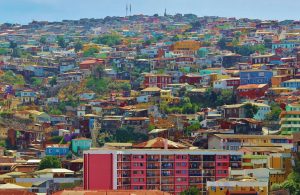 Humanity has largely reshaped the “natural” environment to more readily meet human needs, and in doing so has devastated large areas and neglected important aspects of our planet’s health. Through ignorance and short-sightedness we have caused harm—but it is reparable harm, and restoring the deserts, oceans, and fields is work that is desperately needed. When we see ourselves as an integral part of the living Earth we realize that it makes sense to choose to have a positive rather than a negative impact on our natural environment as we meet our needs.
Humanity has largely reshaped the “natural” environment to more readily meet human needs, and in doing so has devastated large areas and neglected important aspects of our planet’s health. Through ignorance and short-sightedness we have caused harm—but it is reparable harm, and restoring the deserts, oceans, and fields is work that is desperately needed. When we see ourselves as an integral part of the living Earth we realize that it makes sense to choose to have a positive rather than a negative impact on our natural environment as we meet our needs.
This leads to re-thinking our relationship to the Earth, and creating a new economy and culture that supports all of life, cultivates its abundance, and restores its carbon and climate balance. We have the tools to do this, as Paul Hawken and his team have documented in Drawdown, and Bertrand Piccard is doing with the Global Alliance for Efficient Solutions.
![]() The real challenge today is the financing: we need to devote trillions of dollars to transforming virtually every element of our world to make it at least sustainable, if not fully regenerative. Delton Chen‘s Global4C project offers a scalable solution to central banks and international monetary institutions charged with avoiding the risks of global climate catastrophe.
The real challenge today is the financing: we need to devote trillions of dollars to transforming virtually every element of our world to make it at least sustainable, if not fully regenerative. Delton Chen‘s Global4C project offers a scalable solution to central banks and international monetary institutions charged with avoiding the risks of global climate catastrophe.
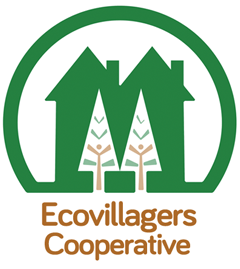 At the other end of the spectrum, we recognize that real resiliency comes down to community, the ability of people to help each other, and to develop natural relationships that align with a flourishing ecology. Thus we are working with Ecovillage New Jersey and the Ecovillagers Alliance to model and to create the eco-neighborhoods and communities of the future.
At the other end of the spectrum, we recognize that real resiliency comes down to community, the ability of people to help each other, and to develop natural relationships that align with a flourishing ecology. Thus we are working with Ecovillage New Jersey and the Ecovillagers Alliance to model and to create the eco-neighborhoods and communities of the future.
Clean Energy Finance
Solving the climate crisis begins with changing the way we generate and use energy. Much of the energy we now create by burning fossil fuels is wasted, and the carbon byproduct of the process has become the world’s largest waste management problem. Altering the way we create and use energy in every building and on every road requires massive investment, which in turn requires that the investment be secure and profitable.
 As New Jersey PACE, we have been the principle advocate for a public-private-nonprofit market-based solution. Property Assessed Clean Energy is about to become a reality in New Jersey through our efforts and those of other pioneers and visionary policymakers. And while we’ve been developing a statewide platform for Commercial PACE, we’ve also been working on “pre-PACE” and “PACE-like” alternatives that can begin to finance clean energy projects that are already in the pipeline wherever PACE isn’t yet available. These alternatives, NICCE(“nice”) and DREEM, are featured at our new Regenerative Financing web site.
As New Jersey PACE, we have been the principle advocate for a public-private-nonprofit market-based solution. Property Assessed Clean Energy is about to become a reality in New Jersey through our efforts and those of other pioneers and visionary policymakers. And while we’ve been developing a statewide platform for Commercial PACE, we’ve also been working on “pre-PACE” and “PACE-like” alternatives that can begin to finance clean energy projects that are already in the pipeline wherever PACE isn’t yet available. These alternatives, NICCE(“nice”) and DREEM, are featured at our new Regenerative Financing web site.![]()
Eco-Community Development
Our work in this area encompasses ecovillages, regenerative cohousing, and neighborhood transformation, using local currencies, dynamic governance, and cooperative ownership.
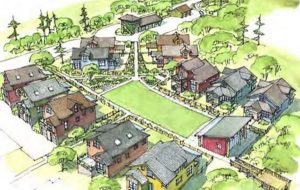 We are fiscal sponsors for Ecovillage New Jersey and the Ecovillagers Alliance, and are committed to the successful realization of their aspirations and impacts on the wider society. We are members of the Common Good system, and invite others to join us in this initiative. We also work with municipalities, communities, and groups (most recently in Bound Brook) as part of our Possible New Jersey program.
We are fiscal sponsors for Ecovillage New Jersey and the Ecovillagers Alliance, and are committed to the successful realization of their aspirations and impacts on the wider society. We are members of the Common Good system, and invite others to join us in this initiative. We also work with municipalities, communities, and groups (most recently in Bound Brook) as part of our Possible New Jersey program.
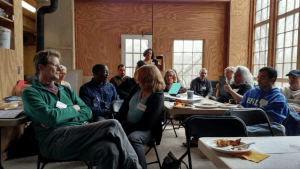 The principal challenge we appear to be facing is that of creating the community we all believe we want. In our view we need to start working together to create a new future for ourselves and for others, including the culture, the economic practices, and the experiences we truly want to share.
The principal challenge we appear to be facing is that of creating the community we all believe we want. In our view we need to start working together to create a new future for ourselves and for others, including the culture, the economic practices, and the experiences we truly want to share.
Regenerative Economic Solutions
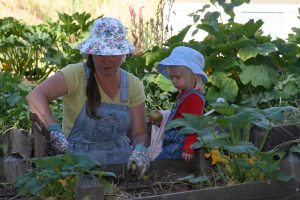 By “regenerative” we mostly mean “supportive of living systems.” We see a regenerative economy as the opposite of the extractive or exploitive economy, not because it doesn’t use the fruits of the process to meet human needs, but because it puts back more—more by way of regenerative capacity—than it takes out. We can have an economy of more, it just needs to be more for Nature (which just happens to encompass us).
By “regenerative” we mostly mean “supportive of living systems.” We see a regenerative economy as the opposite of the extractive or exploitive economy, not because it doesn’t use the fruits of the process to meet human needs, but because it puts back more—more by way of regenerative capacity—than it takes out. We can have an economy of more, it just needs to be more for Nature (which just happens to encompass us).
The regenerative economy, then, is an economy which invests in restoring the soils, the atmosphere, and the oceans. It invests in saving energy and in generating clean, renewable energy. It invests in mitigating and sequestering carbon, removing it from the air and the water and restoring it to the soil, where it enriches the Earth and enables life. We express this by offering financing for clean energy and resiliency (NJPACE and Regenerative Financing), advocating for a global carbon-based currency (Global4C), supporting the formation and evolution of eco-communities, and creating models of economic cooperation.
Creating a Future in which All Beings Thrive
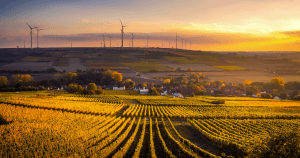 A future in which all beings have the opportunity to fulfill their greatest potential—their potential for self-expression, for relationship, for contribution. From the smallest of living cells to the largest mammals, from the tiniest of seeds to tallest of trees, from the youngest infant to the oldest among us.
A future in which all beings have the opportunity to fulfill their greatest potential—their potential for self-expression, for relationship, for contribution. From the smallest of living cells to the largest mammals, from the tiniest of seeds to tallest of trees, from the youngest infant to the oldest among us.
We contend that this is possible, that we can create a world that works, a world of appropriate solutions, an alternative economy, a fund for local investment, and much more. We believe that we can all do well by doing good, and being smarter and wiser. Becoming “Earth-aware” is a critical first step, recognizing ourselves as inseparable from the ecosphere that gave rise to us, and thinking “from” our self-identification with the planet. By Earth awareness we mean:
- What we know: we know that we are intrinsically dependent on the biosphere and on the web of life for our own existence and well-being.
- What we feel: that we have a responsibility to care for the Earth and to preserve its regenerative capacity for future generations.
- How we act: we can choose to act as stewards of the planet, as the custodians and crew of Spaceship Earth (as Buckminster Fuller called it), as one-hundred percent responsible for the further evolution of life, consciousness, and the fulfillment of our ultimate potential as a species.
If you are interested in joining us in this “conversation for possibility,” we invite you to get in touch with us, share your ideas, and make use of our programs.
